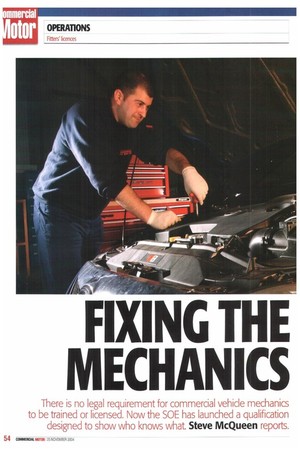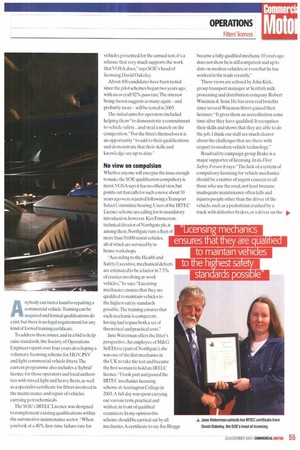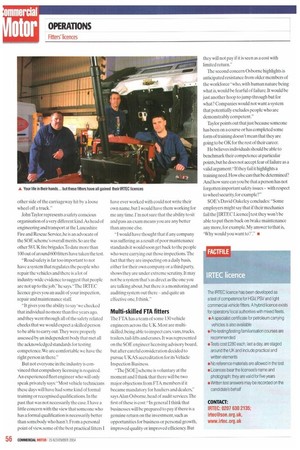FIXING THE MECHANICS
Page 54

Page 55

Page 56

If you've noticed an error in this article please click here to report it so we can fix it.
There is no legal requirement for commercial vehicle mechanics to be trained or licensed. Now the SOE has launched a qualification designed to show who knows what. Steve McQueen reports.
Anybody can turn a hand to repairing a commercial vehicle.Training can he acquired and formal qualifications do exist,but there is no legal requirement for any kind of formal training certificate.
To address these issues, and in a bid to help raise standards, the Society of Operations Engineers spent over four years developing a voluntary licensing scheme for HGV,PSV and light commercial vehicle fitters. The current programme also includes a 'hybrid' licence for those operators and local authorities with mixed light and heavy fleets, as well as a specialist certificate for fitters involved in the maintenance and repair of vehicles carrying petrochemicals.
The SOE's IRTEC Licence was designed to complement existing qualifications within the automotive maintenance sector. "When you look at a 40% first-time failure rate for vehicles presented for the annual test, its a scheme that very much supports the work that VOSA does," says SOE's head of licensing David Oakeley.
About 400 candidates have been tested since the pilot schemes began two years ago, with an overall 92% pass rate.The interest being shown suggests as many again —and probably more — will be tested in 2005.
The initial aims for operators included helping them "to demonstrate a commitment to vehicle safety... and steal a march on the competition." For the fitters themselves it is an opportunity "to add to their qualifications and demonstrate that their skills and knowledge are up to date."
No view on compulsion
Whether anyone will energise the issue enough to make the SOE qualification compulsory is moot. VOSA says it has no official view, but points out that calls for such a move about 10 years ago were rejected following aTransport Select Committee hearing. Users of the IRTEC Licence scheme are calling for its mandatory introduction, however. Ken Ernmerson, technical director of Northgate plc, is among them. Northgate runs a fleet of more than 50,000 rental vehicles, all of which are serviced by inhouse workshops.
"According to the Health and Safety Executive,mechanical defects are estimated to be a factor in 7.5% of crashes involving at-work vehicles," he says. "Licensing mechanics ensures that they are qualified to maintain vehicles to the highest safety standards possible. The training ensures that each mechanic is competent, having had to pass both a set of theoretical and practical tests."
Jane Waterman offers the fitter's perspective.An employee of M& G Self Drive (part of Northgate),she was one of the first mechanics in the UK to take the test and became the first woman to hold an IRTEC licence: -I took part and passed the IRTEC mechanics licensing scheme at Accrington College in 2003.A full day was spent carrying out various tests, practical and written, in front of qualified examiners. In my opinion this scheme should be carried out by all mechanics. A certificate to say Joe Bloggs became a fully qualified mechanic 10 years ago does not show he is still competent and up to date on modern vehicles, or even that he has worked in the trade recently."
These views are echoed by John Kirk, group transport manager at Scottish milk processing and distribution company Robert Wiseman & Sons. He has seen real benefits since several Wiseman fitters gained their licenses: "It gives them an accreditation some time after they have qualified. It recognises their skills and shows that they are able to do the job. I think our staff are much clearer about the challenges that are there with respect to modern vehicle technology."
Road safety campaign group Brake is a major supporter of licensing. In its Fleet Safety Forum it says: "The lack of a system of compulsory licensing for vehicle mechanics should be a matter of urgent concern to all those who use the road, not least because inadequate maintenance often kills and injures people other than the driver of the vehicle, such as a pedestrian crushed by a truck with defective brakes, or a driver on the other side of the carriageway hit by a loose wheel off a truck."
JohnTaylor represents a safety conscious organisation of a very different kind.As head of engineering and transport at the Lancashire Fire and Rescue Service, he is an advocate of the SOF scheme's overall merits. So are the other 58 UK fire brigades.To date more than 100 out of around 600 fitters have taken the test.
-Road safety is far too important to not have a system that regulates the people who repair the vehicles and there is a lot of industry-wide evidence to suggest that people are not up to the job," he says. "The IRTEC licence gives you an audit of your inspection, repair and maintenance staff "It gives you the ability to say 'we checked that individual no more than five years ago. and they went through all of the safety related checks that we would expect a skilled person toile able to carry out.They were property assessed by an independent body that met all the acknowledged standards for testing competence. We are comfortable we have the right person in there," But not everyone in the industry is convinced that compulsory licensing is required. An experienced fleet engineer who will only speak privately says: "Most vehicle technicians these days will have had some kind of formal training or recognised qualifications. In the past that was not necessarily the case. I have a little concern with the view that someone who has a formal qualification is necessarily better than somebody who hasn't. From a personal point of view, some of the best practical litters! have ever worked with could not write their own name, but I would have them working for me any time, I'm not sure that the ability to sit and pass an exam means you are any better than anyone else.
"I would have thought that if any company was suffering as a result of poor maintenance standards it would soon get back to the people who were carrying out those inspections. The fact that they are inspecting on a daily basis. either for their own company or a third party, shows they are under extreme scrutiny. It may not be a system that's as direct as the one you are talking about, but there is a monitoring and auditing system out there and quite an effective one,! think."
Multi-skilled FTA fitters
The FTA has a team of some 130 vehicle engineers across the UK. Most are multiskilled, being able to inspect cars, vans, trucks, trailers, tail-lifts and cranes. It was represented on the SOF engineer licensing advisory board, but after careful consideration decided to pursue UKAS accreditation for its Vehicle Inspection Business.
"The [SOE] scheme is voluntary at the moment and I think that there will be two major objections from FTA members if it became mandatory for hauliers and dealers," says Alan Osborne, head of audit services. The first of these is cost: "In general I think that businesses will be prepared to pay if there is a genuine return on the investment, such as opportunities for business or personal growth, improved quality or improved efficiency. But they will not pay if it is seen as a cost with limited return."
The second concern Osborne highlights is anticipated resistance from older members of the workforce "who, with human nature being what is,would be fearful of failure. It would be just another hoop to jump through but for what? Companies would not want a system that potentially excludes people who are demonstrably competent."
Taylor points out that just because someone has been on a course or has completed some form of training doesn't mean that they are going to be OK for the rest of their career.
He believes individuals should be able to benchmark their competence at particular points,but he does not accept fear of failure as a valid argument:"If they fail it highlights a trainingneed.How else can that be determined? And how sure can you be that a person has not forgotten important safety issueswith respect to wheel security,for example?"
SOF's David Oakeley concludes: "Some employers might say that if their mechanics fail the [IRTEC Licence] test they won't be able to put them back on brake maintenance any more, for example. My answer to that is, Why would you want to?'."
























































































































































































